US says remains determined to enforce sanctions on Iranian oil
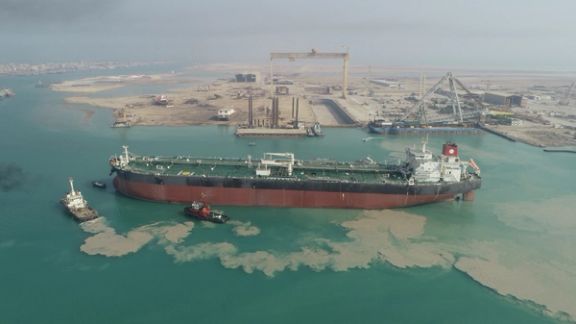
A senior US diplomat insisted on Monday that Washington is committed to enforcing sanctions on Iranian oil sales, citing reports that Iran might be seeking to sell its oil supplies.

A senior US diplomat insisted on Monday that Washington is committed to enforcing sanctions on Iranian oil sales, citing reports that Iran might be seeking to sell its oil supplies.
“We've seen unconfirmed reports regarding the potential transfer and sale of stored Iranian oil," US deputy special envoy for Iran Abram Paley's office posted on X on Monday. "Our sanctions on Iran's oil remain in place and will be enforced."
The post shared a link to a Dec. 3 US Treasury press release detailing new sanctions against 35 companies and ships over their alleged involvement in Iranian oil sales.
The entities and vessels sanctioned "play a critical role in transporting illicit Iranian petroleum to foreign markets," the Treasury statement said.
Iran International reported about Iran trying to offload unsold oil in China on Friday.
Iran's Islamic Revolutionary Guard Corps (IRGC) is seeking to sell oil stored in China before US president-elect Donald Trump can block sales with tougher sanctions, an informed source had told Iran International.
Iranian authorities instructed the IRGC to sell the sanctioned oil stored at Dalian Port in northeast China through intermediary firms, the source speaking on condition of anonymity said.
US Senate foreign relations committee ranking member Senator Jim Risch, a Republican from Idaho, cited the report in a post on X calling for harsher measures.
"For too long, #China’s purchases of illicit Iranian oil have funded #Iran’s terrorism and human rights abuses," a post on the ranking member's official page said.
"The Biden Admin has already let billions back to Tehran from elsewhere – now's the time to use #SHIPAct sanctions to freeze $1B before the #IRGC cashes out again."
Risch was referring to the Stop Harboring Iranian Petroleum (SHIP) Act which passed with broad bipartisan support and aims to impose restrictions on ports and refineries handling Iranian oil exports.
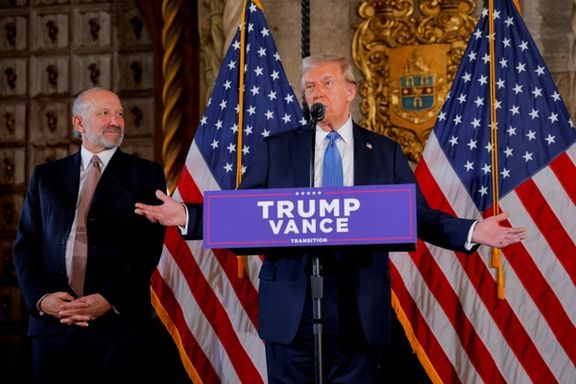
US President-elect Donald Trump declined to answer reporters who asked him on Monday whether he was considering a preemptive strike on Iran’s nuclear facilities during a press conference at his Florida residence, Mar-a-Lago.
“Is that a serious question?” asked the president-elect in his first formal press conference since winning the election last month.
“I can’t tell you that,” said Trump, “Am I going to do preemptive strikes, why would I say that? Can you imagine if I said yes or no? You would say that was strange that he answered that question”
Another reporter followed up by asking if Trump would support Israeli airstrikes on Iran’s nuclear program.
“How could I tell you a thing like that now? You don’t talk about that before something may or may not happen,” Trump responded.
A recent Wall Street Journal report, citing U.S. transition officials, said Trump is weighing the idea of preemptive strikes to stop Iran from building a nuclear bomb, and discussed concerns over Iran's nuclear program with Israeli Prime Minister Benjamin Netanyahu in a phone call.
Throughout the lengthy press conference, the soon-to-be 47th president confirmed his phone conversation but would not provide details other than to say the Middle East will be easier to resolve than the Ukraine-Russia conflict.
“We just had a very good conversation. The real conversations will start on the 20th,” said Trump. “I think we're going to be in a good place in the Middle East. I think actually more difficult is going to be the Russia Ukraine situation.”
Members of Trump’s transition team are reviewing a military option, according to the Wall Street Journal report, following the collapse of Syria’s Bashar Al-Assad and the weakening of Iran’s allies Hamas and Hezbollah.
Iran has enough highly enriched uranium to build four nuclear bombs, according to the United Nations nuclear watchdog.
Tehran has maintained that its nuclear program is for peaceful purposes.
The president-elect was similarly non-committal in an interview last week with Time magazine, which named him 2024 “Person of the Year”.
"Anything can happen. Anything can happen. It's a very volatile situation," he said.

Officials in Iran have announced widespread closures of schools, universities, and government offices on Tuesday as Tehran struggles to curb energy consumption amid a worsening winter crisis.
Authorities in Iran have announced widespread closures of schools, universities, and government offices on Tuesday as Tehran struggles to curb energy consumption amid a worsening winter crisis.
The closures are almost universal but the country’s southern regions with milder climate were less impacted as demand for heating are lower.
The crisis follows a summer of nationwide blackouts as Iran's electricity production and distribution systems failed to meet soaring demand. Now, with plunging winter temperatures in the north and west, the government appears equally unprepared to provide adequate heating for millions of citizens.
Heavy snowfall, rain, and worsening air pollution have compounded the challenges in recent days.
Iran’s president Masoud Pezeshkian has called on Iranians to shoulder the burden and lower their homes’ temperature — advice that has not gone down well with many.
Efforts to curb consumption include reducing government office hours to 8 a.m. to 2 p.m. through February and mandating remote work where feasible. Non-essential businesses have been ordered to close, while shopping centers are required to shut down by 8 p.m. to avoid their gas and electricity supplies cut off.
The closures come amid mounting gas shortages in the gas-rich country, with officials reporting a daily deficit of 350 million cubic meters of natural gas, compounded by a significant shortfall in fuel for power plants.
These deficits have forced more than a dozen power plants offline, intensifying electricity shortages nationwide.
Iran possesses some of the world’s richest energy resources, holding the second-largest natural gas reserves globally, surpassed only by Russia. It also ranks among the top countries in oil reserves.
The chronic energy woes stem from years of underinvestment and the impact of US-led sanctions which have hindered modernization efforts. Mismanagement and inefficiency in the energy sector have further exacerbated the crisis in the oil and gas rich country.
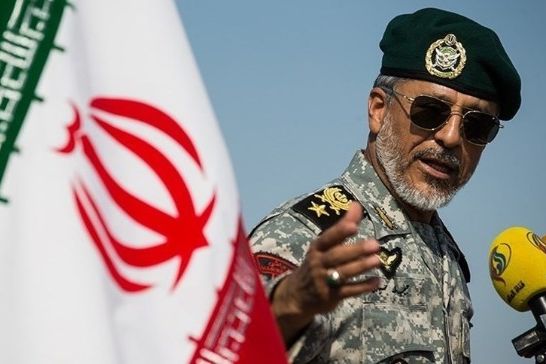
A senior Iranian military officer has expressed concern over the ideological influence of Iran's enemies and the risk of losing out in a technological race for armaments, in a potential sign of greater official unease following regional setbacks.
"The enemies aim to dominate a nation and its land by taking control of minds; we must protect minds, because if they gain control over them, other efforts will be ineffective," Admiral Habibollah Sayyari said in a speech on Monday.
Since nationwide protests in December 2017, there have been increasing signs that many younger Iranians in particular question the Islamic tenets of the governing establishment and oppose regional adventures in Syria, Lebanon and Yemen.
"Ignoring new threats and technologies will undoubtedly lead to strategic surprises for us," Sayyari added. "It is also essential to pay attention to disruptive concepts in warfare."
Israel’s edge in military tactics and weapons have inflicted serious losses on Iran’s main military proxy, the Lebanese Hezbollah in recent months, and have seriously weakened Hamas, its other ally in the region. The fall of Bashar al-Assad in Syria was the latest serious blow to Tehran’s regional influence.
Israel launched a large-scale air attack against Iran in October, devastating its air defenses and several military installations without encountering any serious defense or retaliation.
These led to more expressions of doubt about the Islamic Republic’s foreign and military policy, which openly declares enmity with Israel.
Even many politicians and commentators linked to the governing establishment in Iran have in recent month called for a review of these policies and a serious attempt to improve relations with the West.
Hossein Salami, the commander-in-chief of the IRGC, referred to the developments in Syria as a bitter lesson on Sunday and said that it stands alongside the lessons learned from the Iran-Iraq War.
Sayyari emphasized the importance of social awareness in confronting enemies and referred to inspiring the politically agnostic within society - a group he referred to as the gray spectrum.
"The best way to counter cognitive warfare is to raise awareness among the gray spectrum and increase public vigilance," the admiral said. "The gray spectrum is influential everywhere, and their intelligence and level of awareness must be enhanced for us to effectively prevent this type of warfare."
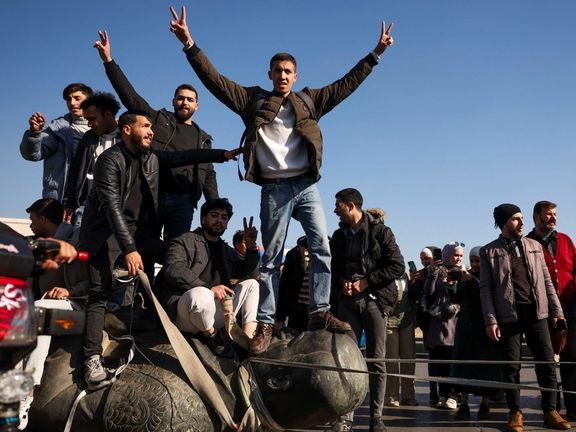
The rivalry between regional powerhouses Turkey and Iran has heated up after Ankara emerged as a leading power broker in Syria following the downfall of Tehran's ally President Bashar al-Assad.
Turkish foreign minister Hakan Fidan, in an interview with Saudi-affiliated Al-Hadath on Sunday, reflected on the shift in regional dynamics, saying Iran must better understand its actions following Assad’s downfall.
“I think Iran will also learn lessons in the new period; we need to help Iran in a constructive way,” Fidan said. He outlined Turkey’s vision for the Middle East as one based on cooperation and respect for sovereignty, adding, “We don’t want Iranian domination, Turkish domination or Arab domination. It’s time for us to come together and establish our own interests, our own order in the region, shoulder to shoulder.”
The foreign minister criticized Assad’s inability to reconcile with his people or rebuild Syria, saying, “Either he [Assad] would have to share power with his people and make peace with them, or he would have to share power with external hegemonic forces that supported him against his people.”
Iran, meanwhile, has reacted strongly to Turkey’s growing influence. On Monday, Kayhan, a hardline newspaper aligned with Supreme Leader Ali Khamenei, accused Turkish President Recep Tayyip Erdogan of exploiting Syria’s conflict for his own political ambitions.
In an editorial titled "This neighbor is no longer trustworthy” Kayhan alleged that Erdogan seeks to revive the “Ottoman Caliphate” and warned of potential blowback. “Turkey’s gamble in Syria could ultimately destabilize Erdogan’s own regime, just as it did Assad’s,” the paper claimed.
Kayhan also accused Turkey of being the “stage manager of the crisis” since the civil war began in 2012, claiming Erdogan has prolonged instability to serve Turkish strategic goals.
While Kayhan accused Ankara of orchestrating a crisis in Syria, Fidan suggested that Assad’s reliance on external forces, including Russia and Iran, was part of his downfall.
“Of course, when he [Assad] shared this power with Russia and Iran, they fought together, they couldn’t take the decisions they wanted because each country had different interests," he said. "And after a certain point, when Assad failed to reconcile with his people, to bring back millions of people, to provide services to the people already in Syria, to provide basic services, to provide services to the economy, the system collapsed by itself.”
Tehran’s discontent with Ankara was hinted at earlier in Supreme Leader Ayatollah Ali Khamenei’s speech last week—his first public response to Assad’s ousting.
Though he did not name Turkey, Khamenei referred to a neighboring country as part of what he called a joint American and Israeli plan in Syria. The comments were widely interpreted as a veiled criticism of Turkey’s involvement.
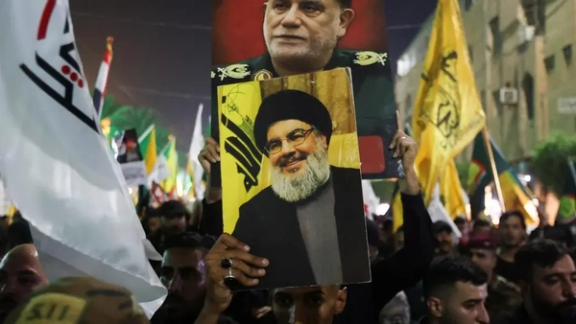
One of Iraq's few independent newspapers has warned that the country may share Syria's fate of prolonged conflict and upheaval if the government fails to distance itself from the Islamic Republic and undertake urgent reforms.
This news analysis comes after Bashar al-Assad in Syria lost his grip on power after support from Iran and its ally Hezbollah were sapped by over a year of conflict with Israel.
Prime Minister Mohammed Shia' al-Sudani, whose tenure is supported in part by Iran-backed armed groups, may now face pressure to prioritize Iraq’s sovereignty over foreign influence according to the daily.
"Iraq remains internally divided over the repercussions of the situation in Syria, with some still supporting intervention at this point. Factions and some actors in the Shiite political scene align with this view, consistent with Tehran’s stance, which has announced the continuation of resistance," wrote Al-Mada.
The Committee to Protect Journalists has said Al-Mada "is seen as one of the only remaining critical newspapers in Iraq".
Operating under the umbrella of the Popular Mobilization Forces (PMF) and supported by the Islamic Revolutionary Guard Corps (IRGC), these groups wield considerable power over Iraq’s governance, military operations, and energy infrastructure.
Despite their original mandate to combat ISIS, many of the militias have since expanded their activities, frequently targeting US forces and installations in Iraq with rockets and drones, and exacerbating tensions between Tehran and Washington.
The paper also highlighted fears of broader regional destabilization following the fall of Bashar al-Assad in Syria, a key ally of Iran.
"Political forces have started warning about scenarios similar to Syria’s situation if rapid internal reforms are not implemented," wrote Al-Mada, citing thinktanks advising Iraqi government to distance itself from the poor governance of the Shiite political forces that have held power since 2003.
Tehran’s armed affiliates in Iraq may be weakened by the developments in Syria. The Australian Arab Institute for Strategic Affairs recently warned that Baghdad faces a critical juncture: either curb the influence of Iran-backed militias or risk becoming a target for escalating Israeli and US military operations.
Adding to the uncertainty are concerns about the potential reactivation of ISIS sleeper cells given the security vacuum next door.
“Iraq is trying to maintain a somewhat balanced relationship with Washington and not align itself entirely with Tehran,” Rahim al-Aboudi, a senior official in the National Wisdom Movement, was quoted as saying.
Growing public discontent
Domestically, public anger toward Iran’s proxies has intensified in recent years, particularly after their violent suppression of 2019 anti-government protests which criticized Iranian influence.
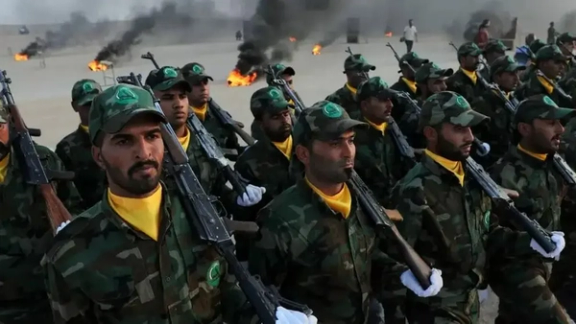
Social media has amplified these frustrations, with posts encouraging attacks on the Iranian embassy and measures to end the activities of armed groups backed by Tehran.
“Numerous individuals or fake accounts have called for citizens to arm themselves in opposition to Iran-backed forces,” Truske Sadeghi, a former Iran International correspondent posted on X.
The warnings of instability echo fears of a repeat of Iraq’s tumultuous recent past.
Unlike the ISIS incursions of 2014 which originated from Syria, analysts warn that any future unrest could arise from within Iraq’s cities, fueled by the same grievances that sparked the 2019 protests but on a potentially larger scale.
While Baghdad has reiterated that its borders are secure, the government’s inability to effectively manage the influence of IRGC-backed militias has left the country vulnerable to both domestic upheaval and regional spillovers.
As Iraq navigates mounting international and domestic pressures, its leadership could face a critical choice: assert greater control over Tehran-backed forces or risk a deeper descent into instability.